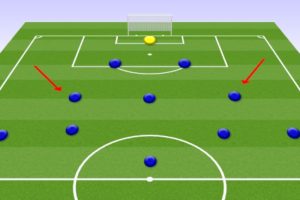The Role of the Centre-Back in Possession-Based Systems: Understanding Their Importance
In a possession-based system, the role of the centre-back is crucial in building up play from the back. As a centre-back in this system, I am responsible for being the first line of attack and the last line of defense. My job is not only to defend but also to start the attacking play by distributing the ball to the midfielders.
Playing out from the back is a tactic that requires a high level of technical ability, decision-making, and composure. As a centre-back, I need to have excellent ball control, passing accuracy, and vision to execute this tactic successfully. Playing out from the back helps our team to dominate possession, control the pace of the game, and create more chances.
However, playing out from the back also carries a certain risk with a high margin of error. One mistake from a centre-back can lead to a counter-attack and a potential goal for the opposition. Therefore, it is essential for me to be aware of my surroundings, communicate effectively with my teammates, and make quick decisions under pressure to avoid costly errors.
Read our guide on being a Center Back in Soccer
The Basics of Possession-Based Systems
Definition of Possession-Based Systems
In possession-based systems, the team focuses on maintaining control of the ball for extended periods of time. The goal is to create scoring opportunities by manipulating the positioning and movement of the opposition. Possession-based systems are characterized by a focus on passing, ball control, and movement off the ball.
Key Characteristics of Possession-Based Systems
There are several key characteristics of possession-based systems. First, teams in possession-based systems prioritize maintaining control of the ball over direct attacking play. Second, possession-based systems emphasize the importance of movement off the ball to create space and passing options.
Third, players in possession-based systems are often highly skilled at passing and ball control. Fourth, the system requires a high level of tactical discipline and patience, as the team may need to maintain possession for extended periods of time before creating a scoring opportunity. In addition to these key characteristics, possession-based systems often rely on specific player roles to execute the system effectively.
For example, the role of the center-back in a possession-based system is critical, as they are responsible for initiating attacks and maintaining possession from deep positions. Other roles, such as the defensive midfielder or the attacking midfielder, may also be essential to the success of the system. Overall, possession-based systems require a high level of technical skill, tactical discipline, and patience to execute effectively.
However, when executed properly, they can be highly effective at creating scoring opportunities and controlling the flow of the game.
| Characteristics of Possession-Based Systems |
|---|
| Emphasis on maintaining control of the ball |
| Focus on movement off the ball |
| Highly skilled players in passing and ball control |
| Requires tactical discipline and patience |
| Specific player roles are critical to success |
The Centre-Back Position in Possession-Based Systems
Role of the Centre-Back in Possession-Based Systems
In possession-based systems, the centre-backs play a crucial role in initiating attacks and building up play from the back. The centre-backs are responsible for receiving the ball from the goalkeeper or other defenders and distributing it to the midfielders or forwards. They must have excellent passing skills and be able to read the game to make quick and accurate decisions.
Centre-backs in possession-based systems are also required to be comfortable on the ball and able to carry it forward when necessary. They must be able to dribble past opposing players and create space for their teammates to move into. This requires a high level of technical ability and composure under pressure.
Skills Required for Centre-Backs in Possession-Based Systems
To excel in possession-based systems, centre-backs must possess a range of skills beyond the traditional defensive attributes. These include:
- Passing: Centre-backs must have excellent passing skills, both short and long-range, to initiate attacks from the back.
- Dribbling: Centre-backs must be comfortable on the ball and able to dribble past opposing players when necessary.
- Composure: Centre-backs must be able to maintain their composure under pressure and make quick and accurate decisions.
- Reading the game: Centre-backs must be able to read the game and anticipate the movements of their teammates and opponents.
- Communication: Centre-backs must be vocal and communicate effectively with their teammates to organize the defense and initiate attacks.
In possession-based systems, the centre-backs are expected to be more than just defenders. They are key players in building up play from the back and initiating attacks. To do this effectively, they must possess a range of skills beyond the traditional defensive attributes.
Tactical Considerations for Centre-Backs in Possession-Based Systems
Building from the Back
As a centre-back in a possession-based system, my primary responsibility is to help start the team’s attacks from the back. This means that I need to be comfortable on the ball, able to make accurate passes under pressure, and have a good understanding of the team’s overall strategy.
In order to build from the back effectively, I need to be aware of my positioning on the field. I should be positioned in a way that allows me to receive the ball from the goalkeeper or other defenders, and have a clear view of the entire field. This means that I need to be able to read the game well, anticipate the movements of the opposition, and make quick decisions.
Pressing and Counter-Pressing
In a possession-based system, pressing and counter-pressing are crucial elements of the defensive strategy. As a centre-back, I need to be able to press the opposition effectively when they have the ball, and counter-press when we lose possession.
To do this, I need to be able to read the game well, anticipate the movements of the opposition, and communicate effectively with my teammates. I should also be comfortable with playing a high defensive line, as this will allow us to press the opposition effectively and win the ball back quickly.
Defensive Shape and Covering
Maintaining a solid defensive shape is essential in any system, but it is particularly important in possession-based systems. As a centre-back, I need to be able to read the game well, anticipate the movements of the opposition, and communicate effectively with my teammates in order to maintain a solid defensive shape. I should also be comfortable with covering for m
y fellow defenders when they are out of position, and be able to make quick decisions under pressure. This means that I need to be able to read the game well, anticipate the movements of the opposition, and communicate effectively with my teammates. Overall, as a centre-back in a possession-based system, my role is crucial to the team’s success. By building from the back, pressing and counter-pressing effectively, and maintaining a solid defensive shape, I can help the team to control the game and create scoring opportunities.
Conclusion
As a centre-back in a possession-based system, my role is crucial in both defense and attack. In defense, I am responsible for defending central areas, organizing and maintaining defensive shape, and winning individual battles. In attack, I must retain possession, build from the back, and get forward on set pieces.
To accomplish these tasks, I need to have strong positional discipline and reading of the game. I must be able to anticipate the opposition’s moves and react quickly to any threats. I also need good communication skills to keep my teammates organized and informed.
One of the key aspects of playing in a possession-based system is being comfortable on the ball. I need to be able to play accurate passes from a deep, central position, and spread the ball out to either wing or look to find a run in behind the opposition with a direct pass. I also need to be able to drive into midfield when I have the space, before looking to find attacking midfielders quickly.
Overall, the role of the centre-back in a possession-based system is demanding, but also rewarding. It requires a combination of physical, technical, and mental skills, as well as a deep understanding of the team’s tactics and strategies. With the right training and experience, however, I am confident that I can excel in this role and help my team achieve success on the pitch.







